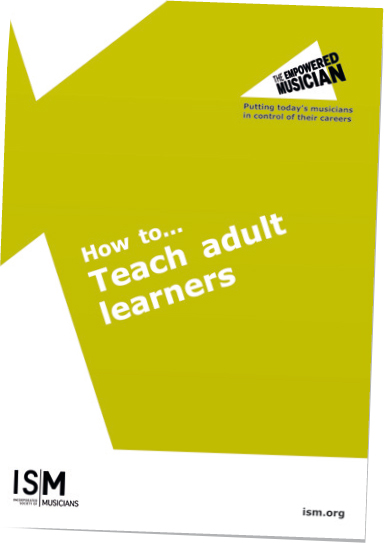
Lucinda Mackworth-Young is a former teacher of both children and adult learners, an author, lecturer and workshop leader, and the director of the Piano Teachers’ Course UK from 2007 to 2020. She is now their International Director.
As we continue to deal with COVID-19 and regional lockdowns, you may be looking at how to expand your clientele to include adult learners, particularly as adults are likely to be looking to take up a hobby with the time we're being asked to spend at home. The ISM's How to teach adult learners provides guidance to get you started, looking at topics such as ‘Beginning to teach adults’, ‘Maintaining motivation’, ‘Knowing how to teach’ and ‘The business side’.
The majority of instrumental and vocal teachers begin their careers teaching children, usually in schools. Hence when adult learners first make enquiries, and often these are the parents of our first pupils, we can find ourselves feeling ill-equipped. The main difference between teaching adults and children is that adults tend to come with clear personal motivation: an idea in their minds, or feeling in their hearts, of what they want to achieve. And, of course, they are paying, and are free to walk away whenever they wish.
Begin by finding out about their personal motivation. It's vital that we take time at the outset, through email, a telephone conversation or an initial consultation lesson, to key into their inner vision and find out what they are hoping for from us.
Here are some examples of why adults come for lessons:
- To pick up from where they left off at school, often many years later
- To begin from scratch, because they always wanted to learn, but never had the chance
- To learn outside the conventional box: for example, to play spontaneously without notation
- To play pop, rock and jazz rather than the classical repertoire they learned when they were younger
- To take up a new recreation that's good for their brain and fingers, often because their partner plays or sings, and is encouraging them
- To have help composing their own songs, and to be able to accompany themselves singing (a favourite for singers learning the piano).
We need to feel equipped to offer our learners what they want and if we feel unsure or unable, we should say so and either offer a trial period or recommend a colleague or internet search in their chosen direction.
Let's say an adult learner has started lessons with you, and that you have noted down their aims and are happily working with them. However motivated they are, learning is about developing understanding and achieving skills that they don't yet have: about pushing themselves beyond their current boundaries. It can be a great deal more challenging and can take much more time than expected.
Adults who have never played or sung before, and re-starters who have had a long gap in their learning, will need to strengthen and develop their musical sense, deepen their musical understanding and connect all of this to their fingers, vocal chords and body, involving the use of many muscles – often for the first time. New neural pathways will need to be formed in the brain, and the effort needed can feel to the learner rather like having to push through dense, dark undergrowth in a forest, repeatedly, in order to create a footpath which will eventually become a main road.
Finding themselves struggling and ‘unable to do it’ can be especially hard for adults who are used to feeling competent in their daily lives. And these feelings are made worse because their learning has to take place in front of the teacher, the authority figure.

Although we teachers are as encouraging and supportive as we can be, there is a psychological level at which learners unconsciously transfer on to teachers the role of parent – the ultimate authority, judge and executioner – and place themselves into the role of child – desperately seeking approval and fearing disapproval as a matter of life and death. In this case, musical life or death. But, being adults in our society where it's not okay to be vulnerable, they won't show it!
In order to help our learners maintain motivation through challenge and difficulty, we need to offer unfailing support and empathy, foster an equal relationship based on mutual respect, and provide extrinsic motivation.
To explore this topic in more detail, and to look at the business side of teaching adult learners, including marketing, logistics and fees, ISM members can access the full guide at ism.org/advice-centre.
Lucinda Mackworth-Young is a former teacher of both children and adult learners, an author, lecturer and workshop leader, and the director of the Piano Teachers’ Course UK from 2007 to 2020. She is now their International Director.








